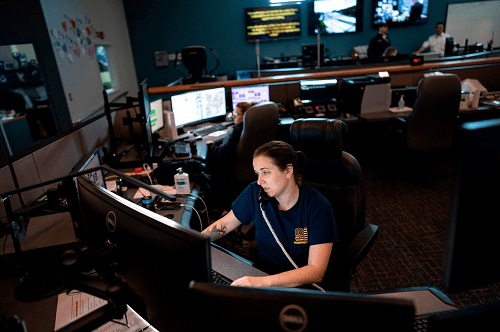
10.6.21 – Fox News via New York Post – SACRAMENTO, CA
Every year, more than 850,000 calls are made to the Sacramento County Sheriff’s Department, where dispatchers work 10-hour shifts four days a week at the call center. However, the department is faced with a challenge other communities across the country are facing in call centers. The department is working on limited staff.
“There’s somebody trying to break into my house, it looks like one person, please send someone,” said a frantic Sacramento County resident during a recent 911 call.
Every year, more than 850,000 calls are made to the Sacramento County Sheriff’s Department, where dispatchers work 10-hour shifts four days a week at the call center.
However, the department is faced with a challenge other communities across the country are facing in call centers. The department is working on limited staff.
“It’s been a hard couple of years for communication centers and the people that work inside of them,” Bureau Commander Burk Stearns said.
In emergency situations, people usually make the first calls to 911 for help. However, there are growing concerns about longer wait times when every second could mean the difference between life and death in some situations.
“Seconds do matter,” Wooten said. “If it’s a police call, it can mean the difference between finding a perpetrator or not.”
Every year, more than 240 million calls are made to 911 nationwide, according to the National Emergency Number Association.
“It’s been difficult, because of quarantine, and other illnesses that have come about,” Stearns said.
In Sacramento County, COVID-19 has left many of the desks empty where dispatchers would normally sit. However, it’s not just in California where the dispatcher desks are empty, which is leading to longer wait times.
Communities in Texas, Colorado, Indiana and other areas in the country are working with limited staff, according to Ty Wooten, director of governmental affairs for the International Academies of Emergency Dispatch.
Many staff members at the Sacramento County Sheriff’s Department Communications Center are now working up to 15-hour days, even on their days off.

“You also have the potential for increased errors, because if we’re working people more, then they don’t have the time to get the rest which can lead to problems when they are working,” Wooten said.
Wooten said it also leads to burnout, causing many dispatch staff to quit, which has contributed to the struggle of finding staff.
“We’ve definitely been working harder, with overtime, and we’ve brought in extra help to make sure calls are answered,” Stearns said.

Training is also one of the challenges of getting people on the job, both Wooten and Stearns said. In some cases, it could take up to six months before trainees are ready to answer calls.
“I never worked here, I came here as a commander and to get to know the people behind the phone I took for granted as a patrol officer. You click your radio and the dispatcher makes things happen for you, it’s humbling” Stearns said.
